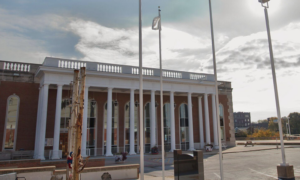Citing need for housing, GREDF proposes incentives for development
Quincy Herald-Whig QUINCY — The Quincy City Council will consider a plan to incentivize housing development in the city.
Aldermen on Monday heard results of a two-year housing assessment that found a lack of housing locally.
Kyle Moore, president of the Great River Economic Development Foundation said the study found there are 588 jobs open locally that pay more than $36,000 a year, but only 104 residential units available.
According to Moore, nearly 60% of GREDF’s members believe that there is a housing shortage in Quincy.
“Members like Blessing Hospital and Knapheide Manufacturing began to tell us they were having to put new hires in hotels and Airbnbs because they could not find a suitable place to live,” Moore said.
GREDF’s plan, should the council choose to proceed after reviewing it in the next month, would be partially funded by a grant program called Research in Illinois to Spur Economic Recovery. The program is intended to speed up economic recovery from COVID-19 by funding new economic plans on the local level. According to Moore, recent precedent has made housing a valid recipient of the grant.
“On average, the city once issued 67 new residential permits per year with a value of $10.8 million,” Moore said. “Post-pandemic there was an average of 23 permits issued with a value of $9.2 million. In the last 10 years, there were six years where there were zero requests for new subdivisions.”
In addition to these issues, seniors in Quincy are breaking from the generations before them by remaining in their homes long after their children have left. Combined with a lack of housing in the $100,000 to $200,000 range and elevated construction equipment and material expenses, Quincy is struggling to attract the young professionals that employers need.
“Using today’s cost to construct a new home $130,000 would buy you a house of approximately 600 square feet, not large enough for a growing family,” Moore said. “Based on our study, we conclude that to keep up with demand, Adams County needs 400 units built this year, 500 over the next five years and 1,600 in total over the next 10 years.”
RISE funded the initial research phase of the project but requires GREDF to obtain permission from the City Council before financing the implementation of the project.
The plan, which was also presented to the Adam’s County Board, dictates housing incentives be offered to reduce prices, a revolving loan program and partnerships with banks and community organizations to raise awareness of federal and state housing programs.
Preliminary concerns offered by aldermemn after the meeting included the risk that construction companies will simply take advantage of incentives to increase their profit margins, marking the price up to current market rates.
In other business, the Central Services Committee opted to table the proposed riverfront electrical burial project due to high costs, and a lack of support from Ameren Illinois. The project, at its lowest quote, will cost $1.184 million.
The committee also suspended the reconstruction of Hampshire from Eighth to 10th until construction prices fall or further grants become available.
The committee approved $75,000 to replace a garbage lift, as well as $119,000 for a small garbage truck.
Treasurer Linda Moore announced the city’s new utility payment system, Invoice Cloud, will go live at 8 a.m. Aug. 28. The new system will offer more control over payments, allowing users to pay before the due date, Customers who previously had auto-pay set up will have to register again, but those with bank auto-drafting set up will continue to pay the same way.


